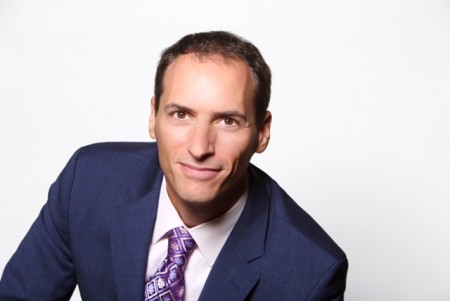General counsel of Fortune 500 company talks gratitude, empathy and a decade of lessons he learned

Ari Kaplan. Photo by Lauren Hillary.
Ari Kaplan recently spoke with Matt Fawcett, the general counsel of NetApp, a Fortune 500 cloud data services and data management company headquartered in Sunnyvale, California.
Ari Kaplan: Tell us about your background and your role at NetApp.
Matt Fawcett: I started practicing with a couple of large law firms and made the transition in-house at a very large Japanese electronics conglomerate. Later, I joined a fiber optic telecom company, where I first served in the role of general counsel. And about 10 years ago, I moved to NetApp as its second general counsel to manage all of the legal affairs of a company that is in transformation, transforming to a cloud-based company. Our legal team is quite distributed, sitting in about 15 different countries and 25 cities around the world.
Ari Kaplan: How has the pandemic impacted your approach to managing the company’s legal affairs?
Matt Fawcett: On one hand, we have always been highly distributed as a legal team. Our philosophy has always been to have people and resources in the locations where our clients are, so we have become fairly adept at working together across geographic boundaries and time zones. From Day One, we have talked about knowing how to pass the ball in the dark to each other, so in that sense, with the pandemic, I think we have adapted fairly well. On the other hand, it has double underscored the critical importance of being excellent at distributed working—not just as a team but also in support of our clients. We are, therefore, highly focused on becoming even more digitally optimized to support the company, which will be in a work-from-home dominant model, at least until July of 2021.
Ari Kaplan: Congratulations on your 10th anniversary as a NetApp’s general counsel. To mark the occasion, you shared a LinkedIn article featuring the advice you would have found valuable when you started. What inspired you to write it?
Matt Fawcett: I like posting my thoughts about leadership and management on LinkedIn. I’ve published dozens of articles, and that is my creative outlet. I have always been someone who really enjoys writing and thinking about how teams work, so the 10-year mark seemed to be a good occasion for that.
Ari Kaplan: You noted in your post that you have designed and implemented a new approach to delivering a company’s legal services. What was the most challenging aspect of engaging in that effort?
Matt Fawcett: The biggest part was probably changing the mindsets of people on the team in terms of how we want to move forward. As those of us who are lawyers or work with lawyers know, it is a very conservative style of working and also a risk-intolerant style of working. We wanted to try a different approach to see if there was a better way of serving our clients, but persuading some professionals to embrace a little bit of ambiguity as we went through the transition was incredibly hard. Convincing them to try things that might not work and be willing to fail was very difficult because lawyers and legal departments pride themselves on intellectual depth, accuracy and completeness. In order to make this transformation, we had to get messy, embrace ambiguity and, frankly, to become a learning organization, as opposed to a knowing organization. You have to cross that chasm of deep insecurity, so the biggest challenge is a mindset shift and maintaining that throughout the transformation.
Ari Kaplan: What were your favorite pieces of advice in the article?
 Matt Fawcett, the general counsel of NetApp.
Matt Fawcett, the general counsel of NetApp.
Matt Fawcett: First, if you are going to be a change agent, you can intellectualize how challenging the change will be and how hard it will be to drive, but until you are doing it, you don’t really appreciate it. It is almost like having your first child. You know in your head that it is going to be hard, require long nights with little sleep, and result in exhaustion for a year. But knowing that and then actually experiencing it are two different things. So the change aspects can be really challenging, taxing you emotionally, physically and personally. You just have to be prepared for a lot of hard work there. Second, everything is up for grabs, and being willing to question anything is really valuable for any kind of executive or leader coming into a new situation. For example, early in my time at NetApp, we were moving our offices from one of our buildings on campus to another. Like most legal departments, we had a large war room, where we kept all of our paperwork, but due to the volume, the facilities team asked us for $50,000 to install steel-reinforced beams to support the weight of our records in the new storage area. Before paying, we asked whether we needed it all and ended up discarding literally tons of documents. There are so many things that just accrete over time in a large, complicated company that do not make sense for the future, and the willingness to ask the questions can really yield major changes.
Ari Kaplan: Two of your points were to learn about your company and build trusted networks. How can one best accomplish those goals in this environment?
Matt Fawcett: The second one is probably easier than the first one right now because there are so many great tools for people to connect with each other. There are general counsel networks around the world that are easy to join and provide access to lots of like-minded people who can really help accelerate what you are working on. I have also been able to connect with people on LinkedIn, and it serves as a great resource even when everyone is working from home and cannot attend the same conference together. To learn about the company, the best thing to do is to make as many connections as you can and ask lots of questions. Most companies have lots of easily accessible resources to teach you who they are and how they operate. The key is interacting with people in different locations and in different functions through one-on-one meetings and making connections. By and large, people want to tell you what’s working and what’s not to give insight into the way the company operates.
Ari Kaplan: You also highlighted the value of speed. How do you move quickly in a law department but manage the risks of doing so effectively?
Matt Fawcett: That is the holy grail, and I believe the pandemic has underlined this. Prior to 2020, we were saying that speed is the currency of a company’s success because if you can eliminate as many friction points in completing transactions with customers or serving them, you will be doing your company a favor. When we started, nondisclosure agreements were a friction point because everything was individually negotiated. Now, about 90% of our NDAs are automatic and do not require any human touch. Our philosophy is that the more of those things we can automate, the more we can enable our sales team to serve their customers without having to go through a legal knothole for approval and frees our team to work on more complex matters. Enabling as many things to be low-touch or no-touch is, and has been, a philosophy of our team since Day One.
Ari Kaplan: Your final point was to take nothing for granted. What does that mean for the legal community moving forward?
Matt Fawcett: We are all working from home, for the most part now, and if we all assume the status quo, going forward will be more like what we are in now and less like what we were in a year ago. As a result, we have to appreciate what that means for our people and for ourselves in terms of health and wellness. My team is doing well, and we need to appreciate that given the uncertainty. Taking time to express gratitude at the moment will help set us up to be resilient, as we go through whatever the waves are over the next couple of years.
Listen to the complete interview at Reinventing Professionals.
Ari Kaplan regularly interviews leaders in the legal industry and in the broader professional services community to share perspective, highlight transformative change and introduce new technology at his blog and on iTunes.



